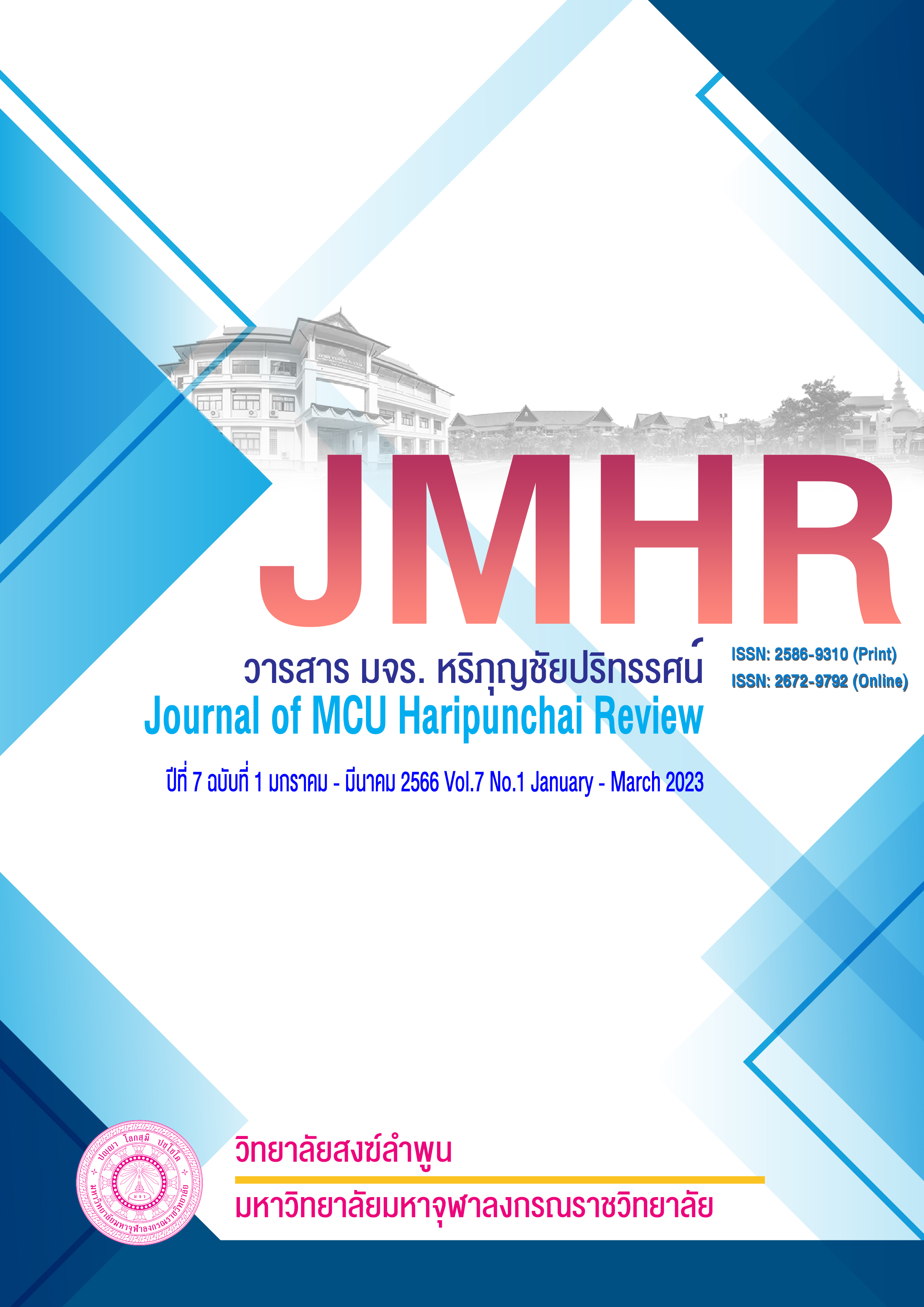ประสิทธิผลการจัดการขยะมูลฝอยตามหลัก 3R พื้นที่กลุ่มกรุงธนใต้ กรุงเทพมหานคร
Main Article Content
บทคัดย่อ
การวิจัยเรื่องมีวัตถุประสงค์เพื่อ (1) ศึกษาประสิทธิผลการจัดการขยะมูลฝอยตามหลัก 3R พื้นที่กลุ่มกรุงธนใต้ กรุงเทพมหานคร (2) ศึกษาปัญหาและอุปสรรคของการจัดการขยะมูลฝอยตามหลัก 3R พื้นที่กลุ่มกรุงธนใต้ กรุงเทพมหานคร และ (3) ศึกษาแนวทางการพัฒนาประสิทธิผลการจัดการขยะมูลฝอยตามหลัก 3R พื้นที่กลุ่มกรุงธนใต้ กรุงเทพมหานคร รูปแบบการวิจัยเป็นการวิจัยเชิงคุณภาพ ผู้ให้ข้อมูลสำคัญ คือ กลุ่มผู้บริหารหน่วยงานภาครัฐ กลุ่มพนักงานผู้ปฏิบัติงาน และกลุ่มประชาชน ในกรุงเทพมหานครพื้นที่โซนกลุ่มกรุงธนใต้ จำนวน 26 คน โดยการคัดเลือกแบบเจาะจง เครื่องมือที่ใช้ในการวิจัย คือ แบบสัมภาษณ์ ทำการวิเคราะห์ข้อมูลโดยวิธีการพรรณนา ผลการวิจัยพบว่า (1) ประสิทธิผลการจัดการขยะมูลฝอยตามหลัก 3R พื้นที่กลุ่มกรุงธนใต้ กรุงเทพมหานคร ได้แก่ นโยบายการบริหารจัดการ งบประมาณ ระบบการจัดการขยะ ระบบการขนส่งขยะ มาตรการทางกฎหมายในการจัดการขยะ การสร้างเครือข่ายความร่วมมือ และการมีส่วนร่วมของประชาชน (2) ปัญหาและอุปสรรคอุปสรรคของการจัดการขยะมูลฝอยตามหลัก 3R พื้นที่กลุ่มกรุงธนใต้ กรุงเทพมหานคร พบว่า จำนวนประชากรเพิ่มขึ้น การขาดจิตสำนึก งบประมาณ เจ้าหน้าที่ และวัสดุ อุปกรณ์ไม่เพียงพอ หน่วยงานไม่เข้าใจในนโยบาย การไม่ให้ความร่วมมือ บังคับใช้กฎหมายไม่จริงจัง ขาดการบริหารจัดการที่ดี ประชาชนขาดความรู้ ขาดมาตรการจูงใจ และ 3) การพัฒนาประสิทธิผลการจัดการขยะมูลฝอยตามหลัก 3R พื้นที่กลุ่มกรุงธนใต้ กรุงเทพมหานคร ได้แก่ การรณรงค์ประชาสัมพันธ์ให้ความรู้ สร้างแรงจูงใจและปลูกจิตสำนึก ปรับปรุงระบบงานเก็บขนให้เป็นระบบ การสร้างเครือข่ายความร่วมมือ การผลักดันกฎหมายบังคับใช้กับธุรกิจ การบังคับใช้กฎหมายกับผู้ที่กระทำความผิด ควรจัดหาวัสดุ อุปกรณ์ เจ้าหน้าที่ และงบประมาณให้เหมาะสม ปรับปรุงระบบการจ่ายค่าธรรมเนียมให้เป็นออนไลน์ และส่งเสริมให้เกิดการสร้างรายได้จากขยะ
Article Details

อนุญาตภายใต้เงื่อนไข Creative Commons Attribution-NonCommercial-NoDerivatives 4.0 International License.
เอกสารอ้างอิง
กรมโรงงานอุตสาหกรรม. (2559). ตำราระบบการจัดการมลพิษกากอุตสาหกรรม. กรุงเทพมหานคร : กระทรวงอุตสาหกรรม.
ฐาณิญา พงษ์ศิริ. (2564). ตัวแบบการจัดการการจัดเก็บและขนถ่ายขยะมูลฝอยชุมชนขององค์กรปกครองส่วนท้องถิ่น. Veridian E-Journal, Silpakorn University. 11(1), 1572-1587.
ณิชชา บูรณสิงห์. (2560). ขยะอิเล็กทรอนิกส์. กรุงเทพมหานคร: สำนักงานเลขาธิการสภาผู้แทนราษฎร.
นฤนาท ยืนยง และ พิชชานาถ เงินดีเจริญ. (2563). การมีส่วนร่วมของประชาชนในการจัดการขยะมูลฝอยของตำบลสาพะเนียง อำเภอโนนแดง จังหวัดนครราชสีมา. วารสารวิชาการและวิจัย มหาวิทยาลัยภาคตะวันออกเฉียงเหนือ. 12(2), 279-296.
นิตย์ สัมมาพันธ์.(2546). ภาวะผู้นํา: พลังขับเคลื่อนองค์กรสู่ความเป็นเลิศ. กรุงเทพมหานคร: อินโน
กราฟฟิกส์.
ยุพิน ระพิพันธุ์. (2544). ความรู้ ทัศนคติ และการจัดการที่ส่งผลต่อการมีส่วนร่วมของคณะกรรมการชุมชนในการจำแนกประเภทมูลฝอย ที่ใช้ในชีวิตประจำวันก่อนทิ้ง ในเขตเทศบาลเมืองพนัสนิคม อำเภอพนัสนิคม จังหวัดชลบุรี . กรุงเทพมหานคร: มหาวิทยาลัย
เกษตรศาสตร์.
ภิศักดิ์ กัลยาณมิตร และวชิรวัชร งามละม่อม. (2561). แนวทางการพัฒนาการจัดการขยะมูลฝอยขององค์กรปกครองส่วนท้องถิ่น. วารสารวิชาการแพรวากาฬสินธุ์ มหาวิทยาลัยกาฬสินธุ์. 5(1), 172-193.
รัชกร วัฒนพันธ์. (2562). การบริหารจัดการขยะมูลฝอยของสำนักงานเขตบางขุนเทียน. กรุงเทพมหานยคร: บัณฑิตวิทยาลัย มหาวิทยาลัยสยาม.
วิทยา ทัศนไพบูลย์. (2560). การพัฒนากลยุทธ์การบริหารจัดการขยะขององค์กรปกครองส่วนท้องถิ่นจังหวัดกำแพงเพชร. วารสารวิชาการเครือข่ายบัณฑิตศึกษามหาวิทยาลัยราชภัฏภาคเหนือ. 7(13), 67-82.
สันชัย พรมสิทธิ์. (2562). การจัดการขยะขององค์กรปกครองส่วนท้องถิ่น ขนาดใหญ่ กลาง เล็ก ในภาคตะวันออกเฉียงเหนือ. วารสารวิชาการและวิจัย มหาวิทยาลัยภาคตะวันออกเฉียงเหนือ.9(1), 67-81.
สุวิน ศรีเมือง และภูกิจ ยลชญาวงศ์. (2563). การสร้างเครือข่ายการมีส่วนร่วมในการแก้ปัญหาขยะชุมชนในเขตหนองแขม กรุงเทพมหานคร. วารสารบัณฑิตวิทยาลัย พิชญทรรศน์, 15(1), 203-211.
องค์การบริหารส่วนตำบลสระกระโจม กองสาธารณสุขและสิ่งแวดล้อม. (2562). การนำขยะกลับมาใช้ใหม่. [ออนไลน์]. แหล่งข้อมูล : https://www.srakrajom.go.th [วันที่25 พฤษภาคม 2565].
อรอนงค์ โต้งยะ และหัชชากร วงศ์สายัณห์ .(2561). ปัญหาการจัดการขยะมูลฝอยของกรุงเทพมหานคร กรณีศึกษาพื้นที่เขตหนองแขม. กรุงเทพมหานคร: มหาวิทยาลัยราชภัฏสวนสุนันทา.
ฮารูน มูหมัดอาลี. (2561). รูปแบบการจัดการขยะมูลฝอยในพื้นที่กรุงเทพมหานคร. วารสารรังสิตบัณฑิตศึกษาในกลุ่มธุรกิจและสังคมศาสตร์. 4(2), 297-314.
Green Network .(2562). ลดการสร้างขยะด้วยแนวคิด 3R ลดใช้ นำกลับมาใช้ซ้ำ และรีไซเคิล. [ออนไลน์]. แหล่งข้อมูล : https://www.greennetworkthailand.com/ลดปริมาณขยะ-แนวคิด-3r/ [วันที่21 พฤษภาคม 2565].
workpointTODAY. (2565). ส่องสารพัดปัญหากรุงเทพ “ขยะ” กับงบประมาณหมื่นล้านบาทต่อปีที่สูญเสียไป. [ออนไลน์]. แหล่งข้อมูล : https://workpointtoday.com [วันที่18 เมษายน 2565].
Fiedler, Fred. E. (1967). A Theory of Leadership Effectiveness. New York: McGraw-Hill.
Campbell, R. F. (1977). Introduction to Educational Administration. Boston: Allyn and Bacon
William J. Reddin. (1970). Managerial Effectiveness. New York: McGraw-Hill Book.


